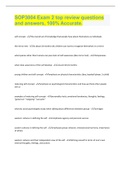Exam (elaborations)
SOP3004 Exam 2 top review questions and answers, 100% Accurate.
SOP3004 Exam 2 top review questions and answers, 100% Accurate. self concept - the overall set of knowledge that people have about themselves as individuals the mirror test - at about 18 months old, children can start to recognize themselves in a mirror what species other than humans can...
[Show more]



